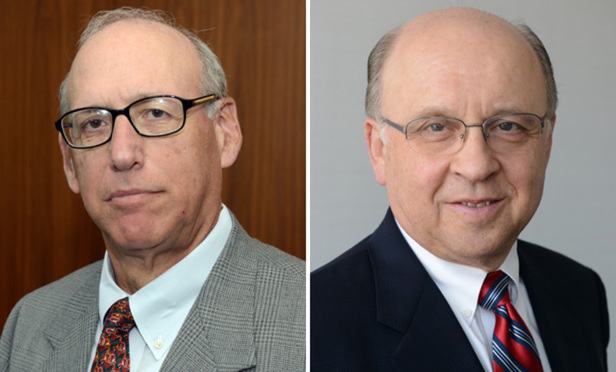Peter Brown

May 08, 2017 | New York Law Journal
Rulings on Trade Secrets Taken From an Employer's CloudIn their Technology Law column, Richard Raysman and Peter Brown discuss two different cases that reached different conclusions when deciding whether former employee use of cloud-based services as a conduit for the transfer of former employer information can be actionable.
By Richard Raysman and Peter Brown
13 minute read

April 10, 2017 | New York Law Journal
Don't Send the Same Text to a Debtor RepeatedlyIn their Privacy Matters column, Richard Raysman and Peter Brown focus on the recent 'Flores' decision, a case in which the plaintiff received the same text message multiples times despite replying "Stop".
By Richard Raysman and Peter Brown
12 minute read

March 13, 2017 | New York Law Journal
Recent Cases Interpreting and Applying the UETAIn their Technology Law column, Richard Raysman and Peter Brown discuss three recent cases dealing with the following issues: if a person's name in the "From" field of an email constitutes a valid electronic signature; whether a username and password to use an app is an electronic signature; and whether a partially automated job application process precludes the authentication of an electronic signature.
By Richard Raysman and Peter Brown
13 minute read

February 10, 2017 | New York Law Journal
A 'Loss' Under the CFAA Does Not Require Interruption of ServiceIn their Privacy Matters column, Richard Raysman and Peter Brown focus on what federal appellate courts actually agree upon with regard to the text of the Computer Fraud and Abuse Act, even though there presently exists a circuit split over the meaning of the word "authorization" as used in the statute.
By Richard Raysman and Peter Brown
14 minute read

January 09, 2017 | New York Law Journal
Broadly Drafted Software Licenses and Their EnforcementIn their Technology Law column, Richard Raysman and Peter Brown discuss the recent Southern District decision in 'PaySys International', in which, because the license broadly defined potential licensees and granted expansive rights under both exclusive and non-exclusive license periods, all of the licensor's copyright infringement claims failed.
By Richard Raysman and Peter Brown
14 minute read

December 12, 2016 | New York Law Journal
The Constitutionality of Using Cell-Site SimulatorsIn their Privacy Matters column, Richard Raysman and Peter Brown discuss two recent cases that reach differing opinions on whether a cell-site simulator was used in a way consonant with the Fourth Amendment protection against unreasonable search and seizures. The opinions do not agree, although this may be due to specific factual circumstances. As such, the legal landscape regarding cell-site simulators remains largely unexplored.
By Richard Raysman and Peter Brown
14 minute read

November 07, 2016 | New York Law Journal
Recent Disputes Over Copyright Licenses Come in Many FormsIn their Technology Law column, Richard Raysman and Peter Brown discuss three cases that involve: whether the duration of rights to a work extend past the relevant license; if and when source code provided, or promised to be provided, to a licensee can sustain either contract or tort claims; and the assignability of copyrighted architectural renderings via an implied license.
By Richard Raysman and Peter Brown
13 minute read

October 07, 2016 | New York Law Journal
Latest Developments in the Law of Unmanned Aerial VehiclesIn their Privacy Matters column, Richard Raysman and Peter Brown write: Given the recency of the Part 107 Rules—which are designed to expand drone use—pertinent precedents are nonexistent. However, prior to the Rules, the opinion issued in 'Huerta' confirmed that the beginning of the intersection between the law and the seemingly infinite potential of drones is in its infancy.
By Richard Raysman and Peter Brown
12 minute read

September 13, 2016 | New York Law Journal
Applying Statutory Immunity in the CDA in Recent CasesIn their Technology Law column, Richard Raysman and Peter Brown analyze two recent cases in the Ninth Circuit that reach differing conclusions on the Communications Decency Act.
By Richard Raysman and Peter Brown
16 minute read

August 08, 2016 | New York Law Journal
Courts Address When an Alleged Employee Hacking Is a CrimeIn their Privacy Matters column, Richard Raysman and Peter Brown analyze recent decisions involving employees accused of hacking into the databases of their own companies, competitors and potential business partners.
By Richard Raysman and Peter Brown
12 minute read
Trending Stories
- 1Gibson Dunn Sued By Crypto Client After Lateral Hire Causes Conflict of Interest
- 2Trump's Solicitor General Expected to 'Flip' Prelogar's Positions at Supreme Court
- 3Pharmacy Lawyers See Promise in NY Regulator's Curbs on PBM Industry
- 4Outgoing USPTO Director Kathi Vidal: ‘We All Want the Country to Be in a Better Place’
- 5Supreme Court Will Review Constitutionality Of FCC's Universal Service Fund
More from ALM
- Legal Speak at General Counsel Conference East 2024: Match Group's Katie Dugan & Herrick's Carol Goodman 1 minute read
- Legal Speak at General Counsel Conference East 2024: Eric Wall, Executive VP, Syllo 1 minute read
- Legal Speak at General Counsel Conference East 2024: Virginia Griffith, Director of Business Development at OutsideGC 1 minute read



